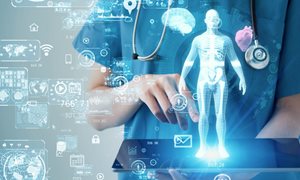
Radboudumc researcher Thomas van den Heuvel receives the Stairway to Impact Award from Dutch Research Council NWO. He receives this prize for the development of the BabyChecker, a smartphone application that allows midwives to make ultrasounds during pregnancies, with the aim of reducing maternal mortality in resourse-limited countries. The BabyChecker is currently used in several African countries.
Every day, more than 800 women die as a consequence of their pregnancy; the vast majority of them live in African countries. To improve monitoring of pregnant women in these countries, Thomas van den Heuvel developed the BabyChecker. This is a smartphone application that allows midwives to make an ultrasound from pregnant women. With the help of Artificial Intelligence, the BabyChecker detects high-risk pregnancies, for example women with a low-lying placenta or a fetus in breech presentation. This makes it possible for women at risk to travel in time to a hospital for the delivery of the baby.
NWO rewards researcher Thomas van den Heuvel with the Stairway to Impact Award, specifically intended for scientific research with a major social impact. He receives this award because he not only developed this application, but also ensured that the BabyChecker is used in various African countries. For this, he works together with Delft Imaging. As Van den Heuvel explains: "The BabyChecker is very easy to use. A midwife receives a short instruction before she can start working with it. The app does not require an internet connection and works in combination with a low-cost ultrasound device. An ultrasound device in the Netherlands costs around 30,000-100,000 euros, but the BabyChecker only costs 3,000 euros,"
Ultrasound for youth health physicians and general practitioners
As far as Van den Heuvel is concerned, his work doesn’t stop here. Together with his colleagues professors Chris de Korte and Bram van Ginneken, he is developing more apps with this technology that can be used in more situations, starting with youth health physicians and general practitioners in the Netherlands. Van den Heuvel: "We are currently developing an application that makes it possible to diagnose developmental hip dysplasia in newborns. Newborns with suspected hip dysplasia are currently referred to the hospital for an ultrasound. Five out of six ultrasounds prove that no hip dysplasia is present, so it would be much more convenient for parents and newborns if the ultrasound could be made at the child health centre. This could also reduce health-care costs." The researchers also want to make it possible for general practitioners to detect all kind of diseases with this device, for example abdominal aortic aneurysms.
Van den Heuvel receives 50,000 euros for his research.
-
Want to know more about these subjects? Click on the buttons below for more news.
More information
Pauline Dekhuijzen

wetenschaps- en persvoorlichter
Related news items
.aspx?width=800&height=534&ext=.jpg&type=BlockColumn1Zoom1)
Aiosyn and Radboudumc are the first in the Netherlands to implement AI in the clinical pathology workflow Digital pathology slides will be screened with a quality control algorithm
4 April 2022 Aiosyn, a company that develops AI-powered computational pathology analysis for clinical diagnostics, and the department of pathology of Radboudumc, will collaborate to implement an algorithm for quality control of digitized histopathology tissue slides. go to page
Department of Medical Imaging takes fourth spot in world hospital rankings
29 October 2021US News rates the Department of Medical Imaging at Radboudumc with a fourth place in the international ranking of best global institutes for Radiology and Nuclear Medicine
go to page
AI helps the defibrillator think
4 October 2021 In the future, the AED and the defibrillator will be able to do more than they do today. Now the devices can only give patients who need to be resuscitated a shock, but in time it will be possible, with the help of artificial intelligence, to say more about the condition of the patient. go to page
New start-up Patholyt will bring AI research into pathology diagnostics
21 September 2021 Patholyt is on a mission to accelerate the adoption of artificial intelligence in pathology diagnostics and improve the chances of cancer patients worldwide. Patholyt is a spin-off from Radboudumc, a frontrunner in computational pathology research. go to page

